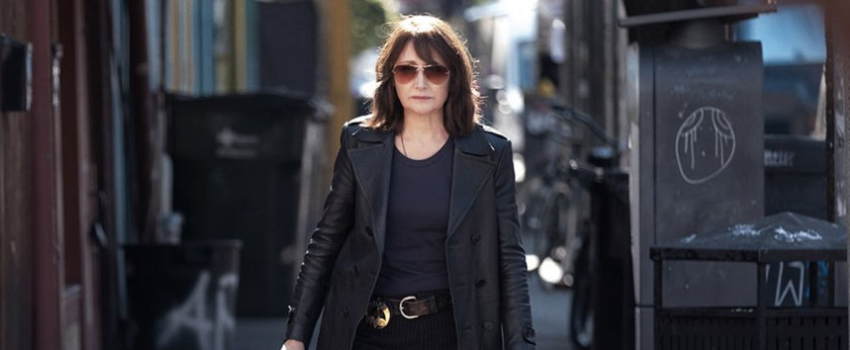Her follow-up to 2015’s The Falling, one of my film’s of that year, Carol Morley’s latest is a detective mystery that, for all its metaphysics, insists on covering the same old ground.
Out Of Blue opens on a dying star in the depths of space as, down in New Orleans, astrophysicist Jennifer Rockwell (Mamie Gummer) delivers a lecture on black holes, dark matter – the great impenetrable mysteries of the universe.
Her body is found the next morning in the observatory; face blown off, water dripping into a pool of her blood. Her red shoe has slipped from a foot and stripy sock lies nearby. One of her colleagues thinks it resembles the work of the .38 Calibre Killer, but Detective Mike Hoolihan (Patricia Clarkson) reserves judgement.
The film reserves a lot: it, like Hoolihan, it’s holding back a secret. Why else the undisguised tropes, the types, the stilted dialogue, the repeated explanation of Schrodinger’s Cat? Why the references to the multi-verse? So many conceptual red herrings.
Based on a book by Martin Amis, Out Of Blue feels studiedly prosaic. It’s a film where people casually relate their back-stories on first encounter. Broadly shot, sunlit and shadowy, Out Of Blue feels it’s a case-of-the-week police procedural in feature form, but too wan, studied and self-conscious to be entertaining.
https://www.youtube.com/watch?v=BJK3BaHvoZY
You spend the majority of 110 minutes waiting for the other shoe to drop, waiting for the trick to be revealed; for it to amount to more. The mystery of Hoolihan and her missing childhood is not enough to lend the mechanics of the plot interest, despite a committed performance from Clarkson; stuck playing an enigma rather than a character.
Much as I love the anti-detective genre, stories that frustrate our capacity to know or understand “the truth”, unreliable is not to say inherently interesting.
Toby Jones plays a pitiful suspect. James Caan, who once was Phillip Marlowe, is Jennifer’s father, The Colonel. Wealthy ex military are typically figures of corruption in film noir. Surely it can’t be that simple? It both isn’t, then it is, then it isn’t again – or is it? Even Jacki Weaver can’t make much of her role as Jennifer’s mother, bright-eyed and scattered in grief.
Transparent and yet obliquely, Morley studiedly goes over the same notes, like a student cramming for a test. A vanishing tub of hand cream. An old torch song, “I’ll Be Seeing You”, played on a tape cassette – when exactly is this film set? – and is lip-synced in a sub-Lynchian dream sequence that only serves to remind how far we are from Mullholland Drive.
When Jennifer’s body is found, her boyfriend (Jonathan Majors) simply asks, “Why?”. As grand existential questions go, it holds true to the film as a whole – so caught up in the what, in the clues and interpretations, both earthly and celestial, that it fails to give us a reason care.
